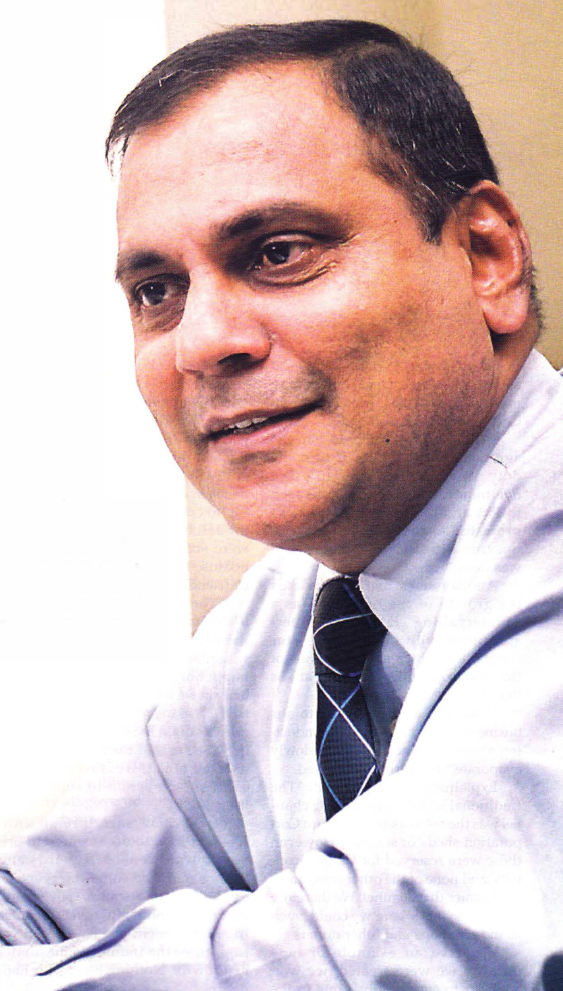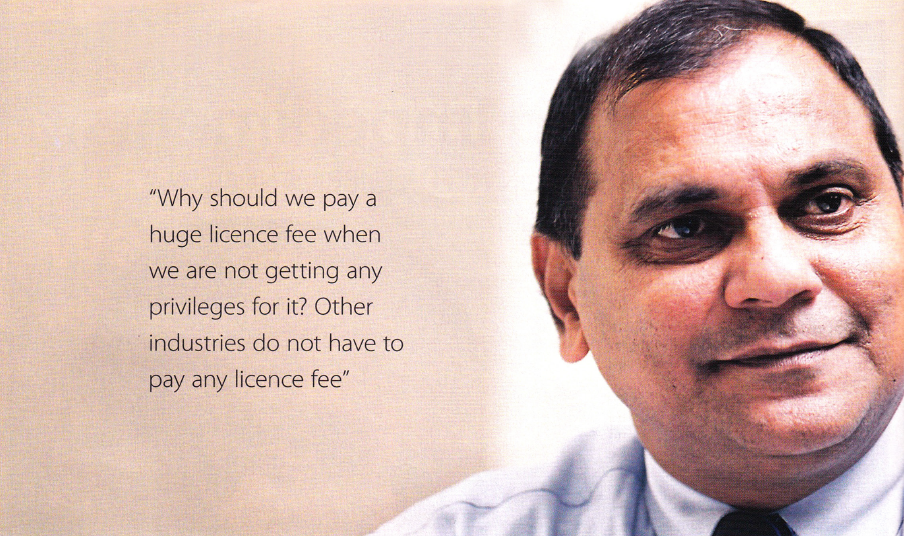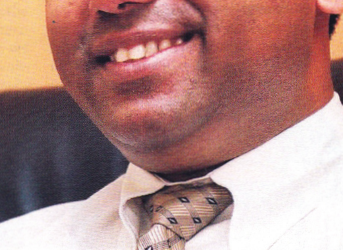Trevor Reckerman, Jt. Managing Director of Mclarens Lubricants, in an interview with Sassanka Samarakkody highlights the shortcomings in the privatisation process with regard to the lubricant industry and the resultant negative impact on the company’s business.

When the petroleum industry, which was a state monopoly, was partially opened up in the mid-1990s for private sector investment, five multi-national players entered the market. Among them was McLarens Lubricants, distributor in Sri Lanka of the international brand Exxon Mobil. At the initial stages of the privatisation process, the manufacture and distribution of gas went to Shell, and Caltex obtained lubricants. Both these entities monopolised the market for about five years. “At that stage, from a state monopoly it became a private sector monopoly, with Caltex entering the market as the sole manufacturer,” Reckerman explained. “In 1999, five other players were permitted to enter the lubricant business, which included McLarens Lubricants, but only to market products – not to manufacture.
“All five private sector entities were multi-national companies and each of us paid the sum of Rs 5m to get the licence, which was valid up to end 2005.” However, according to Reckerman, although at this juncture the monopoly of Caltex seemingly ended, in effect it continued. “Because the duty difference between our products and Caltex at market level was 25%. This as a huge gap and meant that Caltex was able to market their products at much cheaper rate t n the other five players in the field. “The reason given by P C (Public Enterprises Reform Commission) was that they needed to protect the local entity, Caltex, which had bought into a major portion of the Ceylon Petroleum Corporation (CPC). “At the time we entered into the agreement with PERC, it said the duty difference would be 10%. But one month later the gap increased to 15% and finally to 25%. We have protested to the authorities about this unfair treatment, but not much was done.”
Another factor that has hindered the growth of the industry was a countervailing clause in the 1995 agreement with the private sector companies, which said that none of the other companies could sell at less than Caltex. This was a further blow to our business and our intention of conduct-ing a viable business began to slowly evaporate,” Reckerman observed. Explaining further, he said: “The traditional lubricant marketing channel was the network of Petroleum Corporation sheds or stations. However, these were reserved for Caltex products and none of the other companies could enter that channel. We therefore sold lubricants where we could, such as in tyre shops and other outlets. To give an example of how unfairly we were treated, we won a tender to supply lubricants to the Ceylon Electricity Board (CEB). However, soon after we won it, the tender was cancelled. We were later made to understand that the tender was awarded to Caltex, considering the fact that CEB was a government entity. We went to court against this decision and it ended up with us having to contest the cabinet appointed tender board, but our principals were not keen to pursue the matter because they believed it would be an unfriendly act. “The point I wish to make is that if a certain sector is privatised, then the investor interest should also be safeguarded. This certainly is not happening at least as far as the lubricant sector is concerned. We find that in many instances, PERC just goes through the motions of privatising a sector and then simply washes its hand of it; there is no monitoring or follow-up action to support the industry.
Reckerman says foreign entities that look to do business in SriLanka want some safeguards and there should be some intervention by PERC. “For instance, they should be flexible enough to revise a clause in an agreement if it has a negative impact on the industry and hinder its growth. Nothing like this is happening. In 2005, the agreements of all the private companies, including the agreement with Caltex, came to an end. “But it appeared that the government was not ready to move forward and we were told to continue with the agreements as they were. Therefore the status quo remained and with a change of government, nothing really happened. “Then in January 2006 we were suddenly summoned by PERC and told that in order to renew our licence, we have to pay a further sum of RslO million, calculated at Rs2m per year.
At the time we signed the agreement in 1995, we were made to understand that the licence fee of Rs5m was a onetime payment. “They also wanted others to enter the market. I guess someone had made a calculation based on the licence fee and decided this was a good way to get some additional revenue to the state coffers. Caltex too had to pay a licence fee this time round. Earlier, since they bought into the CPC, the question of a licence fee had not arisen. “We have suggested to PERC that in that case, we should be permitted to enter the manufacturing field, which is presently monopolised by Caltex. in order for us to become a profitable entity. This will now come to pass with the recent RFQ (Request For Qualification) announced by PERC. However it will be interesting to study if the economies of scale support such a venture. In such a scenario, we need to have a large offshore market, which presently is commanded by countries like Singapore and Dubai, who are conducting very efficient operations. “We also told PERC that since they wanted us to pay a further licence fee, the market should not be opened to more players, because the lubricant market is very small – its around six to seven percent growth per year.
“Anyhow, PERC has called for expression of interest for more companies to enter the market and the applications closed on August 28. We believe that, if at all, there should be no more than 10 players, and they should all be reputable companies. Otherwise the market will only fragment and investments will simply dry up. “At the same time, why should we pay a huge licence fee when we are not getting any privileges for it? Other industries do not pay any licence fee. Even the original licence was of no benefit to us – we only managed to survive, but got nothing in return.”
The government is looking at internationally recognised companies, rated according to API (American Petroleum Institute) standards. “That is a reasonable approach. Local companies must be encouraged to participate so long as the accepted international standards are maintained. However, this may be difficult as the market was closed for 10 years, but with the right collaboration these barriers can be overcome,” he said. Reckerman is of the view that private companies were able to survive so far because they are all multi-national entities, marketing a quality product. “For all of us it has been a struggle. We have not lost but our profit margins are minimal.
“Local companies must be encouraged to participate so long as the accepted international standards are maintained. However, this may be difficult as the market was closed for 10 years, but with the right collaboration these barriers can be overcome.”
As for Mobil, we are an international brand represented in all sectors. Next to Caltex, we are number two in the market and cover automobile, industrial, marine, aviation and the power sectors. In fact we cover the entire gamut, and not many companies can boast of this feat. “We also have a very strong presence in the synthetic market – we have a certain leadership there. I could say we are also the preferred oil supplier to all the franchise car companies. Most of the top companies have tied up with us for the supply of their lubricants. Unlike the older vehicles that go for cheaper oils new vehicles look for quality. We are therefore strongly represented in the new vehicle market and have tied up with Mercedes, BMW, Toyota, Audi, Subaru, etc. As far as I can see, Honda is the only renowned brand that’s not with us.
“That itself shows our strength in the market, but what we don’t have are the critical numbers. Even if all the five companies are put together, the turnover does not add up to a billion rupees.” Reckerman says that considering the current situation, with labour unrest in the petroleum sector as well as the work in the Colombo Port being disrupted due to regular strike action by employees, many major foreign investors might not be keen to invest in Sri Lanka. “They have alternative investment destinations like Singapore and Dubai,” he pointed out. “We have to give good reasons as to why such companies should consider doing business in this country. Maybe small operators may be interested, but as for international entities, I have my doubts.”
He is of the view that as far as the State is concerned, there is a lack of understanding and knowledge about how the private sector operates and especially the dynamics of the modern lubricant industry. “After the liberalisation of the economy all governments have been talking about a level playing field, where the private sector could compete with the public sector. But the reality is quite different.” According to Reckerman, there were a number of impediments to an open and transparent process of privatisation. What is taking place right now is “survival of the fittest,” he claimed.




